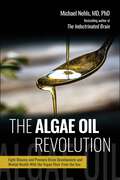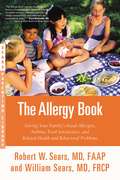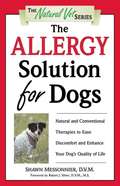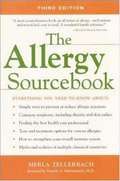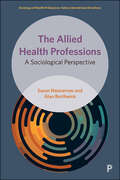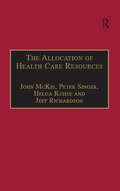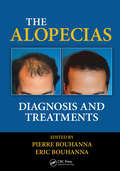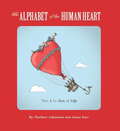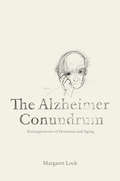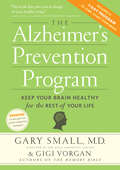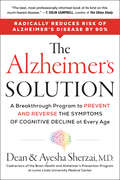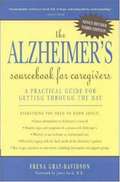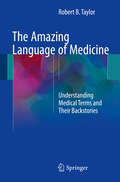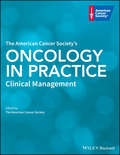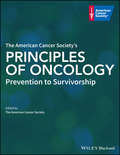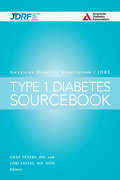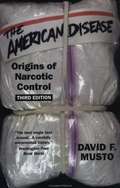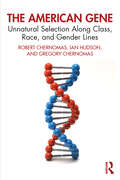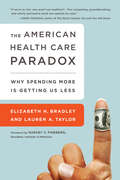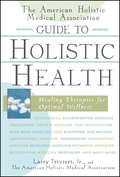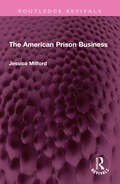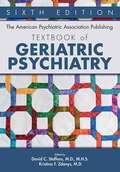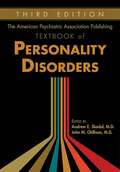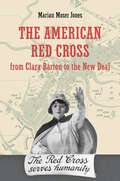- Table View
- List View
The Algae Oil Revolution: Fight Disease and Promote Brain Development and Mental Health with the Vegan Elixir From the Sea
by Michael NehlsFight cancer, Alzheimer's Disease, heart attacks, diabetes, and more with plant-based essential Omega-3 – the elixir of life from the sea Omega-3 fatty acids have played a crucial role in the evolution of our intelligence. Due to our evolutionary history, however, we can efficiently utilize only aquatic omega-3 fatty acids. Yet, fish and seafood are no longer sufficiently available to us due to overfishing of the world's oceans, not to mention their contamination with pollutants. Algae oil is a purely plant-based source of aquatic omega-3 fatty acids and at the same time the only sustainable alternative to address the worldwide deficiency of aquatic omega-3 fatty acids. This deficiency is partly responsible for nearly all modern diseases—ranging from heart attacks to stroke, from depression to Alzheimer's, and from diabetes to cancer. During childhood development, a deficit of this essential brain-building substance leads to severe impairments in emotional, social, and rational intelligence—not least to ADHD and autism. Regular intake of algae oil prevents life-threatening omega-3 deficiency and makes an essential contribution to healthy living. In The Algae Oil Revolution, renowned scientist and bestselling author Michael Nehls introduces the reader to this sustainable and accessible substance, explains why and how it can prevent a range of diseases, and also sheds light on what this discovery means for the future of global human health.
The Allergy Book: Solving Your Family's Nasal Allergies, Asthma, Food Sensitivities, and Related Health and Behavioral Problems
by Robert W. SearsFrom America's most trusted name in pediatrics, a comprehensive guide to treating and preventing nasal allergies, asthma, food allergies and intolerances, and more. Allergies are one of the most common ailments, causing children to miss school and parents to miss work. Left untreated or unresolved, stuffy noses, itchy skin, and irritated bellies can lead to chronic asthma, eczema, inflammatory bowel disease, and neurological disorders. Today's parents don't just want to treat their family's allergy symptoms ¿ they want to eliminate allergies and prevent chronic and long-term health complications. The Sears show them how. Drs. Robert and William Sears present a science-based approach that has helped alleviate allergies in many of their patients, providing a plan not only for treatment, but also for prevention. A family-friendly resource, THE ALLERGY BOOK offers all the reassurance and accessible, practical advice that parents need to resolve their children's allergies, now and throughout their lives.
The Allergy Solution for Dogs: Natural and Conventional Therapies to Ease Discomfort and Enhance Your Dog's Quality of Life
by Shawn MessonnierThe Holistic Approach to Treating Your Dog's Allergies. When your dog is constantly scratching and uncomfortable, you need answers. If the problem is allergies, The Allergy Solution for Dogs can help you provide the best care possible for your beloved companion. Holistic veterinarian Dr. Shawn Messonnier focuses on the pros and cons of natural and conventional treatments. Inside, you'll discover: ·The benefits of nutritional supplements such as antioxidants and fatty acids; How to reduce or eliminate the use of steroids and antihistamines; The benefits of herbal therapy and acupuncture; Diet and nutrition tips for dogs of all ages;·And more! "More and more dogs have skin problems and Dr. Messonnier writes convincingly about over-vaccination and poor nutrition being major causes. With this book, you'll learn many ways to help your dog be more comfortable and how to work with holistic veterinarians to cure skin problems." --Dr. Christina Chambreau, founding member and past chair of the Academy of Veterinary Homeopathy. "Dr. Messonnier provides the answers to where to start and what to expect to improve your pet's health through alternative and traditional veterinary medicine." --Marilyn S. Moore, D.V.M.
The Allergy Sourcebook
by Merla ZellerbachRecipient of the WellnessBooks.com Reviewer's Choice award, The Allergy Sourcebook contains the most up-to-date information available on the many types, triggers, and symptoms of allergies, as well as treatments.
The Allied Health Professions: A Sociological Perspective (Sociology of Health Professions)
by Susan Nancarrow Alan BorthwickThe allied health professions have gained legitimacy through the pursuit of research evidence and the standardisation of practice. Yet there remains very little analysis or understanding of these professions. Adopting theory from the sociology of health professions, this unique text explores the sociological, economic, political and philosophical pressures that have shaped the professions. Drawing on case studies and examples from occupations including optometrists, occupational therapists and physiotherapists to emerging vocations, including pedorthists and allied health assistants, this book offers an innovative comparison of allied health professions in Australia and Britain. By telling the story of their past, this original book prepares the allied health professions for a new and different future.
The Allocation of Health Care Resources: An Ethical Evaluation of the 'QALY' Approach (Medico-Legal Series)
by Peter Singer John McKie Jeff RichardsonThe competition for limited health care resources is intensifying. We urgently need an acceptable method for deciding how they should be allocated. But the goods that health care produces are of very different kinds. Health care can extend the lives of children and of older people. It can make it possible for a person to walk, when without health care that person would be permanently bedridden; and it can reduce the pain and distress of people who are terminally ill. How can we possibly decide which of these - and many more - diverse achievements of health care are more deserving than others? We need a common unit by which we might be able to measure these very different goods. The Quality-Adjusted Life Year, or QALY, is the most developed proposal for such a unit of measure. In this book a distinguished team of ethicists and economists defend the core of the QALY proposal: that health care resources should be used so as to produce more years of life, of the highest possible quality. This leads to a discussion of such fundamental questions as whether all lives are of equal value, whether health care should be allocated on the basis of need and whether the QALY approach incorporates an adequate account of fairness or justice. The result is the most thorough account yet of the ethical issues raised by the use of the QALY as a basis for allocating health care resources.
The Alopecias: Diagnosis and Treatments
by Pierre Bouhanna Eric BouhannaThe Alopecias: Diagnosis and Treatments provides a practical answer to most diagnostic and therapeutic matters related to the different types of alopecia physicians may encounter in daily practice. It also presents a clear classification of all the types of alopecia.Among the topics covered are diffuse alopecia, traumatic alopecia, the male patient
The Alphabet of the Human Heart: The A to Zen of Life
by James Kerr Matthew JohnstoneA handbook for the happy, and a bible for the broken-hearted, The Alphabet of the Human Heart is an enchanting and enriching journey through the upside and the downside of what it means to be human - our hopes and our fears, our strength and our weakness, our highs and our lows.The Alphabet of the Human Heart is a book of literally two halves. Firstly there is upside A-Z, which is full of the happy and hopeful aspects of our lives, such as A is for Adventure, through G is for Gratitude, S is for Smile to Zen is the Place to Be. The other downside half examines the negative parts of our character lives and how we can overcome them to lead more positive and fulfilling lives. From A is for Anger, through H is for Hate, T is for Temptation to once again end on Zen is the Place to be. Matthew and James have been friends for over 30 years and they've experienced both sides of life - the upside and the downside - and they've turned their experience of life - and of friendship - into a book that combines words and pictures to tell a bigger story.Praise for I Had a Black Dog:'I Had a Black Dog says with wit, insight, economy and complete understanding what other books take 300 pages to say. Brilliant and indispensable.' - Stephen Fry'Finally, a book about depression that isn't a prescriptive self-help manual. Johnston's deftly expresses how lonely and isolating depression can be for sufferers. Poignant and humorous in equal measure.' Sunday TimesPraise for Living with a Black Dog:'Moving and thoughtfully written ... a must-have' Daily Mirror'Comprehensive and very helpful ... brilliant' Guardian Weekend
The Alzheimer Conundrum: Entanglements of Dementia and Aging
by Margaret LockWhy our approaches to Alzheimer's and dementia are problematic and contradictoryDue to rapidly aging populations, the number of people worldwide experiencing dementia is increasing, and the projections are grim. Despite billions of dollars invested in medical research, no effective treatment has been discovered for Alzheimer's disease, the most common form of dementia. The Alzheimer Conundrum exposes the predicaments embedded in current efforts to slow down or halt Alzheimer’s disease through early detection of pre-symptomatic biological changes in healthy individuals.Based on a meticulous account of the history of Alzheimer’s disease and extensive in-depth interviews, Margaret Lock highlights the limitations and the dissent associated with biomarker detection. Lock argues that basic research must continue, but should be complemented by a public health approach to prevention that is economically feasible, more humane, and much more effective globally than one exclusively focused on an increasingly harried search for a cure.
The Alzheimer's Cope Book: The Complete Care Manual for Patients and Their Families
by R. E. MarkinThis manual covers everything from talking about Alzheimer's with your loved ones, to deciding whether nursing or home care is right for your loved one. The author includes several helpful checklists, as well as a bibliography.
The Alzheimer's Prevention Program: Keep Your Brain Healthy for the Rest of Your Life
by Gary Small Gigi VorganWant to keep Alzheimer’s at bay for years—ideally, forever? Prevention is the way, and this is the guide. Now in paperback and updated throughout, The Alzheimer’s Prevention Program is essential for everyone with a family history of Alzheimer’s, and for the 80 million baby boomers who worry whenever they forget someone’s name. It’s the book that shows how to strengthen memory and avoid everyday lapses. How to incorporate the top ten brain-protecting foods into your diet. How to cross-train your brain, exercising both the right and left hemisphere. And how to reduce stress, a risk factor for developing dementia and Alzheimer’s, through meditation and 11 other relaxation strategies.Written by the New York Times bestselling authors of The Memory Bible, this book is an easy-to-follow regimen based on the latest comprehensive research into Alzheimer’s disease, and especially the critical connection between lifestyle and susceptibility. The paperback edition is updated with a brand-new section that answers the most compelling questions asked of Dr. Small after publication of the first edition, including: the power of exercise to offset a genetic predisposition; antibodies that can clear Alzheimer’s plaques from the brain; and promising new treatments, from drugs to deep brain stimulation.It’s the science-based, breakthrough program that will bring mental clarity to every day and help you take control of your brain’s health.
The Alzheimer's Solution: A Breakthrough Program to Prevent and Reverse the Symptoms of Cognitive Decline at Every Age
by Dean Sherzai Ayesha SherzaiA revolutionary, proven program for reversing the symptoms of Alzheimer's disease and cognitive decline from award winning neurologists and codirectors of the Brain Health and Alzheimer's Prevention Program at Loma Linda University Medical CenterOver 47 million people are currently living with Alzheimer’s disease worldwide. While all other major diseases are in decline, deaths from Alzheimer’s have increased radically. What you or your loved ones don’t yet know is that 90 percent of Alzheimer’s cases can be prevented.Based on the largest clinical and observational study to date, neurologists and codirectors of the Brain Health and Alzheimer’s Prevention Program at Loma Linda University Medical Center, Drs. Dean and Ayesha Sherzai, offer in The Alzheimer’s Solution the first comprehensive program for preventing Alzheimer’s disease and improving cognitive function. Alzheimer’s disease isn’t a genetic inevitability, and a diagnosis does not need to come with a death sentence. Ninety percent of grandparents, parents, husbands, and wives can be spared. Ninety percent of us can avoid ever getting Alzheimer’s, and for the 10 percent with strong genetic risk for cognitive decline, the disease can be delayed by ten to fifteen years. This isn’t an estimate or wishful thinking; it’s a percentage based on rigorous science and the remarkable results the Sherzais have seen firsthand in their clinic.This much-needed revolutionary book reveals how the brain is a living universe, directly influenced by nutrition, exercise, stress, sleep, and engagement. In other words: what you feed it, how you treat it, when you challenge it, and the ways in which you allow it to rest. These factors are the pillars of the groundbreaking program you’ll find in these pages, which features a personalized assessment for evaluating risk, a five-part program for prevention and symptom-reversal, and day-by-day guides for optimizing cognitive function. You can prevent Alzheimer’s disease from affecting you, your family, friends, and loved ones. Even with a diagnosis, you can reverse cognitive decline and add vibrant years to your life. The future of your brain is finally within your control.
The Alzheimer's Sourcebook For Caregivers: A Practical Guide For Getting Through The Day
by Frena Gray-DavidsonThe Alzheimer's Sourcebook for Caregivers is the only fact-based, hands-on, caregiving guide written by an in-home Alzheimer's caregiver. This unique book helps you work through the personal issues surrounding caregiving, including: how to recognize and manage stress, how to deal with difficult behaviors, how to find outside help when necessary, how to nurture your own well-being, Using her own experiences and those of hundreds of other home caregivers, Frena Gray-Davidson teaches you how to be protective, concerned, and nurturing while still accepting and growing in your new role.
The Amazing Language of Medicine
by Robert B. TaylorThis book tells the intriguing and often colorful stories of the medical words we use. The origins of clinical and scientific terms can be found in Greek and Latin myths, in places such as jungles of Uganda and the islands of the Aegean Sea, in the names of medicine's giants such as Hippocrates and Osler, and in some truly unlikely sources. In this book you will learn the answers to questions such as: * What disease was named for an American space flight? * Do you know the echoic word for elephantine rumbling of the bowels? * What drug name was determined by drawing chemists' notes out of a hat? * What are surfer's eye, clam digger's itch, and hide porter's disease? This book can give you new insights into the terms we use every day in the clinic, hospital, and laboratory. Knowing a word's history assists in understanding not only what it means, but also some of the connotative subtleties of terms used in diagnosis and treatment. The Amazing Language of Medicine is intended for the enrichment of physicians, other health professionals, students, and anyone involved in clinical care and medical science.
The American Cancer Society's Oncology in Practice: Clinical Management
by The American Cancer SocietyDeveloped by the American Cancer Society this new textbook designed for a wide range of learners and practitioners comprehensively addresses all aspects of clinical management for cancer taking a balanced, authoritative and, -where possible- evidence-based stance and may be used in conjunction with the book, The American Cancer Society's Principles of Oncology: Prevention to Survivorship. Edited by leading clinicians in the field and a stellar contributor list from the US and Europe, this book is written in an easy to understand style by multidisciplinary teams of medical oncologists, radiation oncologists and other specialists, reflecting day-to-day decision-making and clinical practice. Input from pathologists, surgeons, radiologists, and other specialists is included wherever relevant and comprehensive treatment guidelines are provided by expert contributors where there is no standard recognized treatment. This book is an ideal resource for anyone seeking a practical understanding of the field of oncology.
The American Cancer Society's Principles of Oncology: Prevention to Survivorship
by The American Cancer SocietyDeveloped by the American Cancer Society this new textbook designed for a wide range of learners and practitioners is a comprehensive reference covering the diagnosis of cancer, and a range of related issues that are key to a multidisciplinary approach to cancer and critical to cancer control and may be used in conjunction with the book, The American Cancer Society's Oncology in Practice: Clinical Management. Edited by leading clinicians in the field and a stellar contributor list from the US and Europe, this book is written in an easy to understand style by multidisciplinary teams of medical oncologists, radiation oncologists and other specialists, reflecting day-to-day decision-making and clinical practice. Input from pathologists, surgeons, radiologists, and other specialists is included wherever relevant and comprehensive treatment guidelines are provided by expert contributors where there is no standard recognized treatment. This book is an ideal resource for anyone seeking a deeper understanding of cancer prevention, screening, and follow-up, which are central to the ACS's worldwide mission on cancer control.
The American Diabetes Association/JDRF Type 1 Diabetes Sourcebook
by Anne L. Peters Jane L. Chiang Lori M. LaffelThe American Diabetes Association/JDRF Type 1 Diabetes Sourcebook serves as both an evidence-based reference work and consensus report outlining the most critical components of care for individuals with type 1 diabetes throughout their lifespan. The volume serves not only as a comprehensive guide for clinicians, but also reviews the evidence supporting these components of care and provides a perspective on the critical areas of research that are needed to improve our understanding of type 1 diabetes diagnosis and treatment. The volume focuses specifically on the needs of patients with type 1 diabetes and provides clear and detailed guidance on the current standards for the optimal treatment of type 1 diabetes from early childhood to later life.To accomplish the book's editorial goals, Editors-in-Chief, Drs. Anne Peters and Lori Laffel, assembled an editorial steering committee of prominent research physicians, clinicians, and educators to develop the topical coverage. In addition, a Managing Editor was brought on to help the authors write and focus their chapters.
The American Disease
by David F. MustoThe American Disease is a classic study of the development of drug laws in the United States.
The American Gene: Unnatural Selection Along Class, Race, and Gender Lines
by Robert Chernomas Ian Hudson Gregory ChernomasBiological justification for all forms of inequality has a long history, with the claim that particular groups suffer disproportionately from inherited flaws of ability and character used to explain a remarkably wide variety of inequalities.Providing an important critique of that biodeterminist history and how the Human Genome Project has inspired some contemporary scientists and economists to follow a similar path of ascribing socioeconomic outcomes to genetic inheritance, The American Gene details new research that suggests that the social and economic environment can affect how genes express themselves in specific human traits and social outcomes. Using the three cases of the American white working class, Black Americans and American women, the authors demonstrate that relying on nature as an explanation is seriously flawed – showing that the socioeconomic inheritance created by the conditions in which these populations worked and lived offer a far better explanation than nature for the stratified results.This book is the story of an American history rife with unnecessary misery and the waste of human potential, along with the liberating effect of understanding the degree to which its citizens are the product of social inheritance and the potential power of a nurturing economy and society that equality promises.
The American Health Care Paradox: Why Spending More Is Getting Us Less
by Harvey V. Fineberg Lauren A. Taylor Elizabeth H. BradleyForeword by Harvey V. Fineberg, President of the Institute of MedicineFor decades, experts have puzzled over why the US spends more on health care but suffers poorer outcomes than other industrialized nations. Now Elizabeth H. Bradley and Lauren A. Taylor marshal extensive research, including a comparative study of health care data from thirty countries, and get to the root of this paradox: We've left out of our tally the most impactful expenditures countries make to improve the health of their populations-investments in social services. In The American Health Care Paradox, Bradley and Taylor illuminate how narrow definitions of "health care," archaic divisions in the distribution of health and social services, and our allergy to government programs combine to create needless suffering in individual lives, even as health care spending continues to soar. They show us how and why the US health care "system" developed as it did; examine the constraints on, and possibilities for, reform; and profile inspiring new initiatives from around the world. Offering a unique and clarifying perspective on the problems the Affordable Care Act won't solve, this book also points a new way forward.
The American Holistic Medical Association Guide to Holistic Health: Healing Therapies for Optimal Wellness
by Larry Trivieri American Holistic Medical Association StaffA complete and comprehensive guide to holistic treatment. Find reputable practitioners and put proven healing therapies to work in your life with this informative and reliable guide to holistic medicine and its primary treatment methods.
The American Prison Business (Routledge Revivals)
by Jessica MitfordFirst published in 1974, The American Prison Business studies the lunacies, the delusions, and the bizarre inner workings of the American prison business. From the first demonstration that the penitentiary is an American invention that was initiated by the late eighteenth-century reformers, to the startling revelations, in the chapter called ‘Cheaper than Chimpanzees’ of how pharmaceutical companies lease prisoners as human guinea-pigs, every page stimulates and surprises the reader as Jessica Mitford describes, inter alia the chemical, surgical and psychiatric techniques used to help ‘violent’ prisoners to be ‘reborn’; why businessmen tend to be more enthusiastic than the prisoners they employ in the ‘rent-a-con’ plan; and the Special Isolation Diet which tastes like inferior dog food. Jessica Mitford’s financial analysis of the prison business is a scoop. Her hard-eyed examination of how parole really works is a revelation. As the prison abolition movement continues to gain momentum, this book will provide food for thought for legislators, officials and students of sociology, law, criminology, penology, and history.
The American Psychiatric Association Publishing Textbook Of Geriatric Psychiatry
by Kristina F. Zdanys David C. SteffensOver the course of more than two decades and five previous editions, The American Psychiatric Association Publishing Textbook of Geriatric Psychiatry has established itself as a foundational resource in the field. This new edition retains the multidisciplinary and developmental perspectives of its predecessors, drawing on the knowledge not only of psychiatrists but also of relevant biomedical and behavioral experts in order to present the most comprehensive approach to patient care. It has been extensively updated to reflect the latest scientific advances and clinical developments in the field. Not only will readers find the most up-to-date information on phenomenology, diagnosis, and assessment of late-life mental disorders, they will also access the latest research on psychotherapeutic, psychopharmacological, and other somatic treatments. A dedicated chapter delves into the role of technology―including digital phenotyping, wearables, digital and Web-based neurocognitive testing, and more―in aiding the geriatric mental health workforce and improving both access to care and ongoing support. Throughout the book, several sections also candidly examine the impact of COVID-19, and its attendant social isolation, on older adult mental health and the evolution of treatment approaches, revealing insights learned about telepsychiatry and care in nursing homes during the pandemic. Chapters on the legal and ethical factors in the psychiatric care of older adults close out the book, the most exhaustive on the topic. Extensively researched and with key points for ease of reference, this edition will equip both the scholar and the clinician with the current state of scientific understanding as well as the practical skills and knowledge base required for dealing with mental disorders in late life.
The American Psychiatric Association Publishing Textbook Of Personality Disorders
by Andrew E. Skodol John M. OldhamThe subject of personality―what makes each of us unique and different from one another―has long been a topic of universal fascination. From a medical perspective, research on personality disorders has expanded with the advent of standardized diagnostic systems. This continuing and increased activity and progress in the field spurred the development of this third edition of The American Psychiatric Association Publishing Textbook of Personality Disorders. With an emphasis on updating the information most relevant to clinicians, this new edition features contributions from established experts in the field as well as a new generation of scientists. Dozens of tables, illustrative figures, and real-life case examples summarize the vast data that continue to accumulate in five key areas: • Clinical concepts, including theories of personality disorders, as well as their manifestations, assessment, and diagnosis. This opening section also describes the Alternative DSM-5 Model for Personality Disorders in detail.• Risk factors for, and the etiology and impact of, personality disorders. This section of the book examines data on prevalence, sociodemographics, and levels of functional impairment associated with personality disorders. It offers both a developmental and a genetic/neurobiological perspective and describes the symptomatic and functional outcomes of personality disorders.• Treatment options across therapeutic modalities. A new, cutting-edge chapter argues for the early identification of borderline psychopathology in children and young adolescents, in an effort to prevent full-blown disorder later in life. Additional chapters delve into an array of individual psychotherapies, pharmacotherapeutic options, and group, family, and couples therapies. Guidance on forming and maintaining a therapeutic alliance and on avoiding boundary violations in treating patients with personality disorders is provided.• Special problems, populations, and settings, including suicide, substance use disorders, antisocial behavior, personality pathology in general medical settings, and personality disorders among active-duty military.• The usefulness of translational research to deepen understanding of the biopsychosocial nature of the personality disorders, particularly borderline personality disorder. This comprehensive textbook is an essential resource for clinicians looking to stay on the vanguard of a rapidly growing field.
The American Red Cross from Clara Barton to the New Deal
by Marian Moser JonesThe American Red Cross is an iconic institution whose long history includes both controversy and achievement.In dark skirts and bloodied boots, Clara Barton fearlessly ventured on to Civil War battlefields to tend to wounded soldiers. She later worked with civilians in Europe during the Franco-Prussian War, lobbied legislators to ratify the Geneva conventions, and founded and ran the American Red Cross. The American Red Cross from Clara Barton to the New Deal tells the story of the charitable organization from its start in 1881, through its humanitarian aid during wars, natural disasters, and the Depression, to its relief efforts of the 1930s.Marian Moser Jones illustrates the tension between the organization's founding principles of humanity and neutrality and the political, economic, and moral pressures that sometimes caused it to favor one group at the expense of another. This expansive book narrates the stories of: • U.S. natural disasters such as the Jacksonville yellow fever epidemic of 1888, the Sea Islands hurricane of 1893, and the 1906 San Francisco earthquake• crises abroad, including the 1892 Russian famine and the Armenian massacres of 1895–96• efforts to help civilians affected by the civil war in Cuba• power struggles within the American Red Cross leadership and subsequent alliances with the American government• the organization's expansion during World War I• race riots in East St. Louis, Chicago, and Tulsa between 1917 and 1921• help for African American and white Southerners after the Mississippi flood of 1927• relief projects during the Dust Bowl and after the New DealAn epilogue relates the history of the American Red Cross since the beginning of World War II and illuminates the organization's current practices as well as its international reputation.
